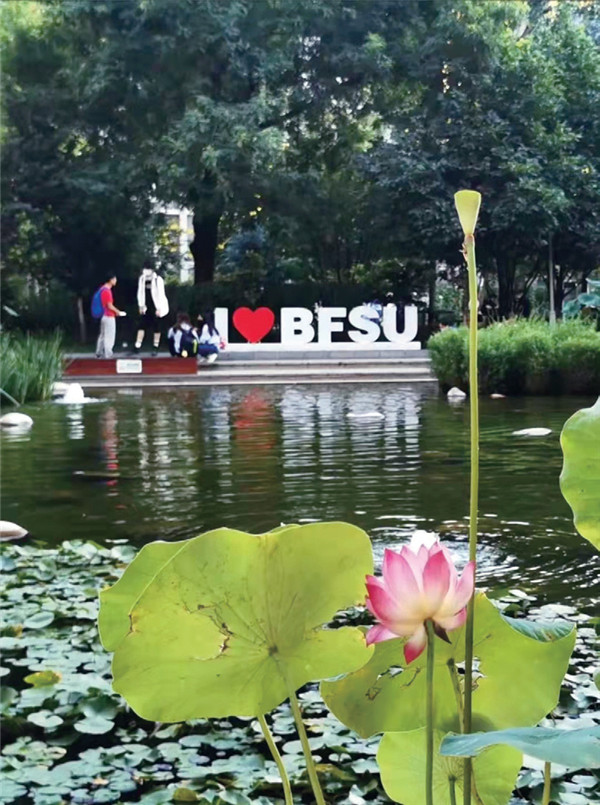邂逅中國,收穫成長
〔泰國〕 傅啟閏 北京外國語大學

説起中國,你首先會想到什麼?是山河蒼茫,還是歷史悠長?是禮儀之邦,還是美食之鄉?也許你的心中有屬於自己的答案,但我的答案很簡單——漢語。正是漢語讓我與中國結緣,讓我邂逅了這樣一個美麗的國家,也讓我成為更好的自己。
我與漢語其實在孩童時代就已經結下了深厚的情緣,透過漢語,我看見了一個美麗的中國、浪漫的中國。在父母的支援下,幼兒園時,我進入華文學校學習。在那裏,我第一次見到來自中國的漢語老師,他們帶著我一起唱兒歌、做遊戲、講故事,還教我説漢語。也是從那時起,我才知道原來這個世界上,有一個國家叫中國,他們説的語言叫漢語。在我進入小學時,學校裏的漢語老師就開始教我們學習中文拼音了。“b,p,m,f……”聽上去就像動聽的音樂,在我的心中久久回蕩著。老師還教我們練習寫漢字,我在“高”字裏看到了雄偉的城樓,在“莫”字裏看到了夕陽漸漸隱沒在草地中的浪漫,在“採”字裏看到了辛勤勞作的場景……那一個個方塊字簡直就像一幅幅美麗的圖畫,描繪著詩情畫意的人生。但即使是面對這麼美麗的漢字,剛開始學習寫漢字的時候,真的覺得好難好辛苦,字音難讀,字形難認,字義難辨……我曾經想退卻,甚至想放棄。不過在熱愛與鼓勵之下,我迎難而上。慢慢地,我不僅掌握了漢字的寫法,也發現了漢字的奇妙。比如“吃”字,混得好叫“吃得開”,受人歡迎叫“吃香”,不顧他人叫“吃獨食”,負擔太重叫“吃不消”……簡單一個字,就可以用在這麼多地方,可見中國的漢字文化有多麼的博大精深。

北京外國語大學 / 傅啟閏提供
雖然我已經掌握了很多的漢字和詞語,但真正運用到生活當中,也鬧過一些笑話,這讓我明白了“慎言”的重要性。記得有一次,我在辦公室裏和我的中文老師聊天,聊著聊著,老師説她要出去買些東西,我就禮貌地對老師説:“老師您一路走好!”老師當時就撲哧一笑。在我不明所以的時候,老師笑著跟我解釋説,這句話是對去世的人説的,並不能表示我想表達的意思。為了表示我的歉意,我想陪老師一起去買東西,所以我又開口對她説:“老師,我送您上路吧!”結果老師又笑得不能自已,我也很茫然,難道我又説了什麼奇怪的話?老師很慈愛地拉著我的手,給我解釋了“上路”的真實含義。現在回想起當時的場景,我還是會覺得尷尬和歉疚,可是我的老師並沒有責怪我,反而讓我記住了這些實際意思與字面意思不同的用法。這也提醒了我,真的是要謹言慎行啊!
因為學習漢語,我也逐漸成長起來,逐漸找到了自己的使命感。學漢語的時間越長,對“學好漢語,走遍天下”這句話的領悟就越深刻。學會了漢語,不僅對我有幫助,我還能幫助別人。去年,新冠肺炎疫情在全球暴發,泰緬邊境很多華人來醫院做檢查,但醫院裏沒有會講漢語的醫生,華人也不會講英語,所以他們雞同鴨講,驢唇不對馬嘴,雙方又著急又無奈地僵持了很久。那時,我剛巧在那裏做體檢,看到了他們所遇到的困難,我就毅然當起了志願者,陪在醫生的身邊做貼身翻譯。在我的幫助下,他們終於能做檢查了,醫生們也不再愁眉苦臉了,我很為他們感到高興。當他們一一對我道謝的時候,我的心情很奇妙,所學能有所用,幫助別人的感覺真的既開心又溫暖。
這便是我與漢語的故事。漢語讓我學習到了很多中國的知識,也讓我成長為更好的自己。其實我從小就有一個夢想,就是真正到中國留學。我想去親眼看看古裝電視劇裏的建築是不是真的那麼華麗,想去聽聽傳統相聲,感受地道的中國文化,更想去體驗中國的“三美”——美食、美景、美人。可是,目前疫情尚未結束,我去不了中國,只能通過網課學習。雖然有些遺憾,不過我也不會氣餒,我相信疫情終究會過去,美好一定會如期到來!我與中國的美麗邂逅,才剛剛開始!
Get Growth in China
〔Thailand〕 Serichai Tatiya, Beijing Foreign Studies University
When it comes to China, what comes to your mind first? Is it the vast territory, the long history, the reputation as the state of ceremonies and decorum, or the renown as a home of delicious cuisine? You may have your own answer, but mine is very simple – Chinese language, because it is Chinese that makes me get to know this beautiful country and be a better self.
I got to know the Chinese language when I was a child. I was amazed to see a beautiful and poetical country through its language. With the encouragement of my parents, I had an experience to be in a Chinese-speaking kindergarten where I first met my Chinese teachers. They led us to sing songs and play games. They told us stories and taught us Chinese. Since then, I have known that there is a country called China and there is a language called Chinese. In primary school, our Chinese teachers began to teach us Chinesepinyin (a Romanized system of the Chinese pronunciation). “b, p, m, f…” it sounded like melodious music, echoing in my heart. We were also taught to write Chinese characters: I could see the magnificent gate towers from the character “高” (tall); I could appreciate the romantic scenery of the gradual sunset behind the grassland from the character “莫” (with original meaning of “sunset” in ancient Chinese); I could see the hardworking in the field from the character “採” (gathering)… Each character was like a beautiful picture, depicting the poetic life. Beautiful as the characters are, it was really difficult for me to learn them at the beginning. The characters were hard to pronounce, difficult to recognize, challenging to understand… In awe of this difficult language, I had even had the idea of giving it up, but at last, with my passions and my parents’ encouragement, I rose to the challenge. Gradually, I not only had a good grasp of the Chinese writing but also discovered the marvellousness of Chinese characters. The character “吃” (with original meaning of “eat”), for instance, can be used in many phrases but with the completely different meanings. For example, “吃得開” (being popular or being sought after), “吃香” (being in great demand or being valued), “吃獨食” (taking the benefit by oneself without sharing with the others), “吃不消” (being unable to bear)… The way that a single character can be used in various ways illustrates the extensiveness and profoundness of the culture of Chinese characters.
Although I thought I had had a good grasp of many Chinese characters and phrases, in real contexts I still made some comical mistakes, from which I realized the importance of “cautiousness in speaking”. There was one time when I was chatting with my Chinese teacher in her office. She said she was going to buy something. I politely said to her “老師您一路走好” (which literally means “take care on your way, my teacher”). She chuckled and I was in great confusion. She then explained to me with a smile that this expression was normally used for the dead (with meaning of “rest in peace”), not what I had supposed it to be. To express my apology, I wanted to help her with her shopping. I said “老師,我送您上路吧” (with literal meaning of “Let me send you on your way, my teacher”). This time she could not help laughing out loud and once again I felt puzzled. Did I say anything ridiculous again? She put my hand in hers amiably and explained to me the true meaning of “上路” (with a literal meaning of “set out on the way” but actually it means “to go towards death”). Now I still feel embarrassed and apologetic when thinking back on that moment. However, my teacher was so kind not to blame me, which helped me to memorize how to use expressions with actual meanings different from their literal ones. This also reminds me that it is really important to be cautious when speaking a new language!
Because of learning Chinese, I have gradually grown up and found my sense of mission. The longer I learn Chinese, the deeper my understanding of the saying “A good learning of Chinese will facilitate your travel around the world.” Learning Chinese not only benefits myself but also makes me be able to help other. When the COVID-19 pandemic hit the world last year, many Chinese people on the Thailand-Myanmar border came to the hospitals for checkups. The doctors there were not Chinese-speaking and the Chinese people did not know how to speak English. The ineffective communications and misunderstanding led to anxiousness and helplessness. I happened to do my physical examination there at that time and I volunteered to be the interpreter. I was very happy to see that with my assistance, the Chinese patients were able to get checkups and the doctors were no longer worried. It was a wonderful feeling when they thanked me, as what I had learned was applicable. I felt happy and warm to help others.
This is my story with Chinese language, which helps me learn a lot of knowledge about China and lets me be a better self. In fact, it has been my dream to study in China since I was a child. I want to see by myself whether the architectures are as magnificent as those in the costume dramas. I want to listen to traditional crosstalk and feel the authentic Chinese culture. It is also my great hope to experience the “three excellences” of China: excellent food, excellent scenery and excellent people. However, I am not able to come to China as the pandemic is not over yet. I can only learn through online classes. Although there are imperfections, I will not be discouraged. I believe that the pandemic will eventually end and happiness will come as expected! My beautiful meeting with China, has just begun!



